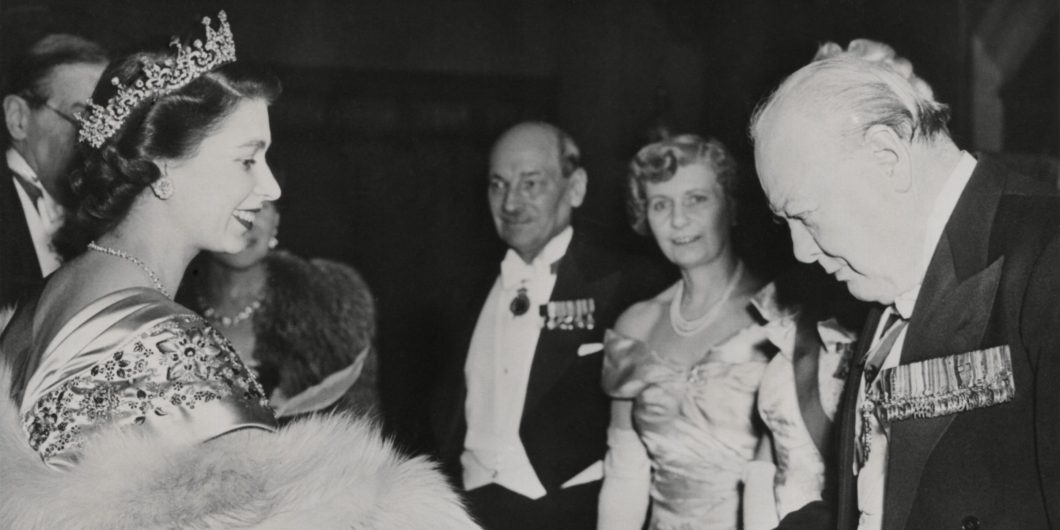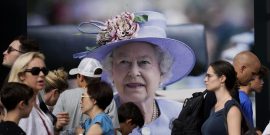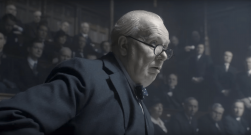It is for their own lost virtues, exemplified by the Queen, that the people mourn.
The Lady and the Lion
Sometime during the night of February 6, 1952, he drew his last breath. Great Britain’s monarch, King George VI, merely fifty-six years old, died quietly from a heart attack in his sleep. The next morning, when the King’s Assistant Private Secretary relayed the death to Prime Minister Winston Churchill as “bad news,” Churchill sharply corrected him. “Bad news?” He spat, “The worst.”
Thrust into the monarch’s throne by a brother who abdicated for the love of twice-divorced Wallis Simpson, King George VI was never meant to be. Shy and stammering, he was the king’s younger brother. And over sixteen tumultuous years — years of almost unparalleled consequence for Britain and the rest of the world — there he stood. Standing for the nation, standing by Winston Churchill, standing for his family through the rise and ignominious fall of Adolf Hitler, through Joseph Stalin and the opening salvoes of the Cold War, through the beginnings of the modern socialized state and the endings of Empire. Now, his body lay cold in a flag-bedecked casket atop a caisson. A card stuffed in the government wreath bore a message in Churchill’s scrawled handwriting: “For Valour.”
Upon the King’s death, the Empire scrambled. His eldest child, Princess Elizabeth, immediately returned from a tour abroad in Kenya. From the time of the dark news, she was referred to as “Her Majesty, the Queen.” Newly awash in propriety and protocols, torn between mourning and planning, the young Queen was forced to grow up even faster. The role of grieving daughter had to give way to that of comforting sovereign. And she did it with grace.
In the ensuing days, Jock Colville, Churchill’s personal secretary, recalled the Prime Minister’s initial inconsolability. “I tried to cheer him up by saying how well he would get on with the new Queen, but all he could say was that he did not know her and that she was only a child.” Even so, Churchill warmed to the notion of the new, young Queen. In his radio address memorializing the King, he ended with a chivalrous rousing, “I, whose youth was passed in the august, unchallenged and tranquil glories of the Victorian Era, may well feel a thrill in invoking, once more, the prayer and the Anthem, God Save the Queen!”
By this time in Churchill’s life, he had been a member of Parliament for over four decades, held numerous ministerial posts, suffered political exile for his prescience about Hitler in the 1930s, midwifed a civilization through world war, and was now halfway through his second term as Prime Minister. Queen Elizabeth was only twenty-five, but a mature twenty-five, to be sure. One thing this young Queen knew, however, was that she shared the affection her father and the English held for the aging Lion of Britain. As the Queen and her first minister began to meet, aides quickly discovered how much the two enjoyed each other. Jock Colville wrote that Churchill “was madly in love with the Queen…and that she got more fun out of her audiences with Churchill than with any of his successors.” Churchill deftly tutored the young monarch, but also learned from her as well. Laughter was ever-present. The Queen’s Private Secretary confessed, “I could not hear what they talked about, but it was, more often than not, punctuated by peals of laughter, and Winston generally came out wiping his eyes.”
Duty and honor, tradition and posterity permeated their persons and required both leaders to disappear into their roles.
One evening with a shaking head, Churchill would mutter, “She is en grande beauté ce soir.” In Churchill’s eyes, Parliament engaged in the grubbiness of governance, but royalty embodied the soul of a nation. “It is natural for Parliament to talk,” Churchill insisted, “and for the Crown to shine.” But Churchill shared in the shine. Once when Queen Elizabeth was accompanied by Churchill up the Thames, he described the “dirty, commercial river” as “a silver thread which runs through the history of Britain.” The Queen took note. “He saw things in a very romantic and glittering way,” she admired, “perhaps one was looking at it in a rather too mundane way.” Churchill saw glitter in the Queen as well. Arriving at his eightieth year, Churchill gazed at Elizabeth’s photo in the newspaper and, considering the beauty, poise, and intelligence of his young sovereign, whispered, “The country is so lucky.”
The Queen and Churchill enjoyed each other privately, in part, because they understood each other publicly. Duty and honor, tradition and posterity permeated their persons and required both leaders to disappear into their roles. The office consumes and outlives the woman and the man. And for the sake of their beloved civilization, the pair always believed, such sacrifice was never too dear. Perhaps Churchill spoke for himself and the monarch when he uttered these words during the dark days of war: “It is not enough that we do our best; sometimes we must do what is required.”
In 1955, Churchill’s health and the state of politics led to him step down as Prime Minister. The Queen wrote a heartfelt letter to him insisting that “[no other Prime Minister would] ever for me be able to hold the place of my first prime minister, to whom both my husband and I owe so much and for whose wise guidance during the early years of my reign I shall always be so profoundly grateful.” In an unprecedented act of affection on his last night as Prime Minister, the twenty-eight-year-old Queen Elizabeth and her husband Prince Phillip joined the eighty-year-old Winston and his wife Clementine for dinner at 10 Downing Street. Churchill raised his glass in a toast to the Queen concluding, “We thank God and vow ourselves anew to the sacred causes and wise and kindly way of life of which Your Majesty is the young gleaming champion.” Later, the Queen penned a note of thanks to Clementine for being a gracious hostess. “I hope you will both now have time for rest and relaxation in the sun.”
Nine years later, on January 24, 1965, Winston Churchill would draw his last breath. That very day, the Queen would issue this order to Parliament: “Confident in the support of Parliament for the due acknowledgement of our debt of gratitude and in thanksgiving for the life and example of a national hero. . . I have directed that Sir Winston’s body shall lie in State in Westminster Hall and that thereafter the funeral service shall be held in the Cathedral Church of St. Paul.” It was a funeral to rival the likes of Horatio Nelson and the Duke of Wellington, vaunted British heroes of the Napoleonic Wars.
And while it was customary for royalty to refrain from attendance, Queen Elizabeth would be the first monarch to attend a commoner’s funeral in a century. In addition, while it is tradition for the Queen to arrive last due to the honor that all should afford her, she made a point to come prior to the Churchill family to grant them the great honor she felt was their due.
In a final letter of condolence to Churchill’s grieving widow, the Queen offered this:
The whole world is the poorer by the loss of his many-sided genius while the survival of this country and the sister nations of the Commonwealth, in the face of the greatest danger that has ever threatened them, will be a perpetual memorial to his leadership, his vision and indomitable courage.
Winston and Elizabeth had a profound friendship rooted in cherished hopes and common values. Once, along with the Queen, the world mourned Churchill. Now it must mourn her.
Requiescat in Pace.



